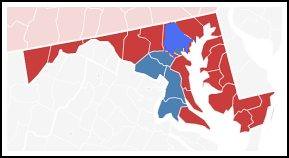Despite getting shellacked in statewide contests, Maryland Republicans actually made significant gains Nov. 2 in races for county commissioner and council seats, expecially in less-populous parts of the state.
Building on those pickups - and in turn building a farm team for bigger races down the road - might be the most realistic strategy at this point, some argue.
While the article acknowledges that the Republican gains in Maryland were mostly in 'less populous' areas, it doesn't discuss how important this point really is, especially in terms of where most of the votes and most of the Maryland population is located--adjacent to Washington DC and in and around Baltimore. Suburbanites in those areas may be less liberal than people in the 'center city,' but at the same time they are likely to be considerably more liberal than residents of exurban and rural areas.
Early election results by county, Maryland Governor's race, modified to include Baltimore County, Washington Post graphic Blue = Democrat, Red = Republican. In 2006, the state population was 5.7 million and the jurisdictions that voted Democrat made up 63% of the state's population. In the next two largest counties, Anne Arundel and Frederick, the Republican slate for Governor won with about 54% of the vote, but as these counties continue to be drawn into their respective center city orbits, the trend away from Republican voting is likely to continue.
So the Republican victories in Maryland (with the exception of the Congressional results in the 1st District) are growing in the least populated, slowest growing areas of Maryland. How is that a good thing for the Republican party and what does it say as the country continues to suburbanize?
Plus, the article doesn't get into how the Republican party appears to be decidedly anti-urban in terms of its policies, at least nationally, (it is true that enlightened Republicans at least in terms of the smart growth issue do actually exist, e.g., Mitt Romney is actually quite good on Smart growth issues and did a lot of good things as governor of Massachusetts--sadly, these policies were seen as 'Republican' not merely smart, and rejected by his Democratic successor).
See:
-- Conservatives' Vision of an America without Cities
-- A line in the suburban sand
See:
-- Conservatives' Vision of an America without Cities
-- A line in the suburban sand


No comments:
Post a Comment